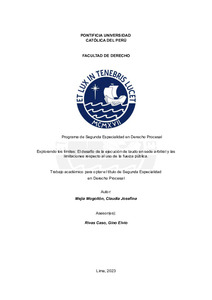| dc.contributor.advisor | Rivas Caso, Gino Elvio | |
| dc.contributor.author | Mejía Mogollón, Claudia Josefina | |
| dc.date.accessioned | 2024-04-01T15:02:03Z | |
| dc.date.available | 2024-04-01T15:02:03Z | |
| dc.date.created | 2023 | |
| dc.date.issued | 2024-04-01 | |
| dc.identifier.uri | http://hdl.handle.net/20.500.12404/27451 | |
| dc.description.abstract | El presente artículo se centra en el análisis de la ejecución de laudos en sede arbitral,
explorando sus límites y posibilidades. A lo largo de sus páginas, se abordarán las
razones subyacentes a la tendencia común de las partes de no recurrir al ámbito arbitral
para llevar a cabo la ejecución de las decisiones arbitrales, prefiriendo en su lugar
recurrir a la vía judicial. La hipótesis propuesta sugiere una percepción errónea que
asocia la ejecución de una decisión exclusivamente con el uso de la fuerza, cuando, en
realidad, existen escenarios en las que ésta no es necesaria. En ese sentido, se
analizará detenidamente las posibles circunstancias en los cuales no se requiere fuerza
pública para la ejecución y, donde los árbitros pueden desempeñar un papel crucial,
siempre y cuando las partes les haya otorgado dicha facultad. Finalmente, se
reflexionará sobre la viabilidad de autorizar a los árbitros el acceso al uso de la fuerza
pública, subrayando la importancia de preservar la autonomía del arbitraje en la
ejecución de laudos. | es_ES |
| dc.description.abstract | This article focuses on a thorough exploration of the enforcement of awards in arbitration
proceedings, highlighting both its limitations and opportunities. Throughout its pages, the
underlying reasons for the common trend of parties not resorting to arbitration for the
execution of arbitral decisions, opting instead to seek enforcement through the judicial
system, will be addressed. The proposed hypothesis points to a misconception rooted in
the mistaken idea that the enforcement of decisions can only be achieved through the
use of force when, in fact, there are situations where this is not necessary. In this context,
the scenarios where the intervention of public force is not required for enforcement will
be carefully analyzed, and where arbitrators can play a crucial role, provided that the
parties have granted them such authority. As a final reflection, there will be an inquiry
into the feasibility of authorizing arbitrators to access the use of public force, emphasizing
the imperative need to safeguard the autonomy of arbitration in the enforcement of
awards. | es_ES |
| dc.description.uri | Trabajo académico | es_ES |
| dc.language.iso | spa | es_ES |
| dc.publisher | Pontificia Universidad Católica del Perú | es_ES |
| dc.rights | info:eu-repo/semantics/openAccess | es_ES |
| dc.rights.uri | http://creativecommons.org/licenses/by-sa/2.5/pe/ | * |
| dc.subject | Arbitraje y laudo--Legislación--Perú | es_ES |
| dc.subject | Arbitros--Perú | es_ES |
| dc.subject | Proceso judicial--Legitimidad--Perú | es_ES |
| dc.title | Explorando los límites: El desafío de la ejecución de laudo en sede arbitral y las limitaciones respecto al uso de la fuerza pública | es_ES |
| dc.type | info:eu-repo/semantics/bachelorThesis | es_ES |
| thesis.degree.name | Segunda Especialidad en Derecho Procesal | es_ES |
| thesis.degree.level | Título Profesional | es_ES |
| thesis.degree.grantor | Pontificia Universidad Católica del Perú. Facultad de Derecho | es_ES |
| thesis.degree.discipline | Derecho Procesal | es_ES |
| renati.advisor.dni | 70024260 | |
| renati.advisor.orcid | https://orcid.org/0000-0002-2072-9064 | es_ES |
| renati.author.dni | 72201488 | |
| renati.discipline | 421109 | es_ES |
| renati.level | https://purl.org/pe-repo/renati/level#tituloSegundaEspecialidad | es_ES |
| renati.type | https://purl.org/pe-repo/renati/type#trabajoAcademico | es_ES |
| dc.publisher.country | PE | es_ES |
| dc.subject.ocde | https://purl.org/pe-repo/ocde/ford#5.05.01 | es_ES |







